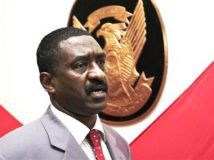Sudan courts well able to deal with Darfur crimes
March 24, 2007 (NAIROBI) — Facing a threat of sanctions, Khartoum said Saturday its courts are capable of dealing with Darfur war crimes and repeated its rejection of the International Criminal Court’s indictments of two Sudanese nationals.
 State Minister for Foreign Affairs Al-Samani al-Wasila said authorities had meted out death sentences to culprits convicted of war crimes, an indication of the government’s crackdown on such offences.
State Minister for Foreign Affairs Al-Samani al-Wasila said authorities had meted out death sentences to culprits convicted of war crimes, an indication of the government’s crackdown on such offences.
“(A judicial) committee that was formed in 2004 found them guilty of committing war crimes … the military were shot dead, the civilians were hanged and others are in prison,” he told a press conference.
“We can assure everybody in the international community that the judiciary system will take necessary steps to ensure justice prevails in the Sudan,” Wasila added.
Khartoum has refused to hand over militia leader Ali Kosheib and Secretary of State for Humanitarian Affairs Ahmed Haroun, facing ICC indictments for alleged crimes in Darfur, saying the panel has no authority over national courts.
“The situation is not that the Sudanese government is hiding or denying, we said this matter is under full consideration of the judiciary,” Wasila added, explaining that the ICC should be “complementary, not a replacement” of the national courts.
“The investigations team said there is no case against him (Haroun), but if there is any fresh (allegation) I can assure to you anybody … in the government can be re-investigated and brought to court,” he added.
The minister said Khartoum, which was among the first African nations to get independence, had well-evolved and time-tested laws that had helped build other countries’ jurisprudence.
“We have a strong history of the judiciary system in Sudan. We helped in building judicial systems in many African and Arab countries,” he added.
“We are a country that cannot be taken like that,” Wasila explained.
But the ICC’s offensive against the Sudanese regime — which stands accused of genocide by Washington and of being responsible for the world’s worst ongoing humanitarian crisis — has left domestic political forces divided.
Diverging views within the unity cabinet itself were again highlighted last week when Salva Kiir, the former southern rebel leader turned first vice president, expressed his dissatisfaction with Khartoum’s policies in Darfur.
The war in Sudan’s western region of Darfur erupted in 2003 when rebels from minority tribes took up arms demanding a fair share of national development.
The conflict has killed around 200,000 people and displaced more than two million.
Western nations have called for more sanctions against President Omar al-Beshir’s regime, aimed at forcing it to let a UN-led peacekeeping force into Darfur.
Beshir, who earlier this month backtracked on an agreement to let 20,000 peacekeepers into the region, accuses the West of wanting to invade his country and plunder its resources.
Prime Minister Tony Blair of Britain, the former Sudanese colonial master, drew flak for calling for a new regime of tough United Nations sanctions.
“This is a typical example of the British negative behaviour towards this problem since the start,” Wasila explained.
“We hope that the British, because they know the situation very well in Africa … come foward with the help in development by providing the very basic rights and health care and education rather than sending these negative messages,” Wasila added.
(AFP)
